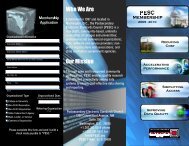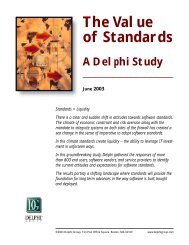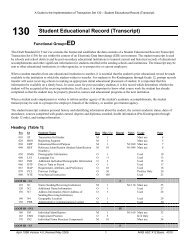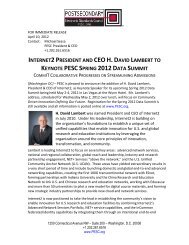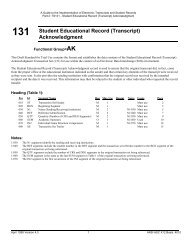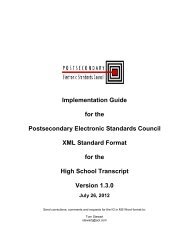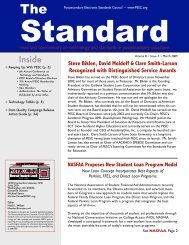February 2013 - PESC
February 2013 - PESC
February 2013 - PESC
Create successful ePaper yourself
Turn your PDF publications into a flip-book with our unique Google optimized e-Paper software.
4<br />
Overview of Results<br />
Knowing what other CIOs are doing and thinking about<br />
brings some degree of comfort and assurance to CIOs as<br />
they plan for the future. In this year’s survey, we continue<br />
to find CIOs grappling with difficult budgets and limited<br />
strategies for increasing available resources. We also<br />
find that even though CIOs are concerned about “new<br />
and emerging technologies,” most of what they list are<br />
not really new and emerging technologies but rather<br />
where they need to invest in the future.<br />
Budgets continue to remain tight as more than 60% of<br />
institutions report their institutional budgets decreasing<br />
or staying the same. Staffing continues to be an issue<br />
for many institutions, as increased numbers of CIOs<br />
reported that their IT staff size decreased from last year.<br />
Many CIOs are cautiously optimistic about the use of<br />
shared services and collaboration to improve life and<br />
budgets on some campuses, and movement to the cloud<br />
continues to grow, but with caution on the administrative<br />
application side. The consumerization movement or<br />
BYOD continues to grow, and 98% of CIOs report that<br />
consumerization is significantly or moderately affecting<br />
their institution. Network expansion continues to plague<br />
many institutions, as fewer institutions reported spending<br />
money and time on a security audit than in the prior year:<br />
37% in 2012 vs. 41% in 2011. The growth in the use<br />
of cloud computing continues, but more with academic<br />
resources and applications than financial applications.<br />
Overall, the data shows that CIOs face major challenges<br />
but seem to be continuing to provide service and support<br />
for an increasing number and variety of applications<br />
and constituents.<br />
Financial and<br />
Budget Planning<br />
The days of cyclical roller coaster budgets in higher<br />
education, with several years of budget increases<br />
followed by a few years of decreased budgets, appear<br />
to be over. In the past five years, CIOs are consistently<br />
reporting tight budgets, with fewer reporting overall<br />
institutional budget increases; more report decreases or<br />
budgets staying flat. At the same time, as institutional<br />
budgets remain tight, IT budgets often lag behind the<br />
institutional budget even as many CIOs find demand<br />
for IT services and new technologies increasing. In<br />
2012, CIOs at research universities seem to be doing<br />
better, with 48.1% reporting IT budget increases while<br />
only 28.6% of two-year institutions reported IT budget<br />
increases.<br />
• This year, 23% of institutions reported that their<br />
institutional budget stayed the same as their<br />
prior year budget, while 34% indicated that their<br />
institutional budget decreased. In 2011, almost 31%<br />
reported that their budgets stayed the same and 29%<br />
indicated that their institutional budget decreased.<br />
• Slightly more than 43% of institutions said that their<br />
institutional budget increased, which is up almost 3%<br />
over 2011 figures.<br />
• Cautious optimism continues, as 70% of institutions<br />
expect institutional budgets to either grow (39%) or<br />
stay the same (31%) in the year ahead.<br />
• Optimistically, slightly more than 41% of institutions<br />
said that institutional budgets grew in 2012, a 7%<br />
increase from 2011.<br />
Budgets for Information Technology<br />
IT spending is tracking closely with overall institutional<br />
budgets. In 2012, almost 59% of the institutions<br />
reported that their IT budgets decreased or stayed the<br />
same. This represents a 5% reduction from 2011 figures.<br />
• This year, 30% of institutions reported that their<br />
IT budgets stayed the same as their prior year’s IT<br />
budget. In 2011, 42% reported that their budgets<br />
stayed the same.<br />
• However, 4% more institutions in 2012 reported a<br />
decrease from their prior year budget. In 2012, 29%<br />
reported a decrease, compared with 25% in 2011.<br />
• The good news is that since 2010, institutions<br />
showing growth in their IT budgets improved from 24%<br />
reporting increases in IT budgets in 2010 to 34% in<br />
2011, and 41% in 2012.<br />
Pessimism about IT budgets for the future seems to<br />
be greatest at two-year institutions. Only 4.8% expect<br />
IT budget increases next year, compared with 39% at<br />
four-year institutions, 32% at four-year institutions with<br />
master’s degree programs, 42% at doctoral-granting<br />
institutions, and 46% at research universities.







